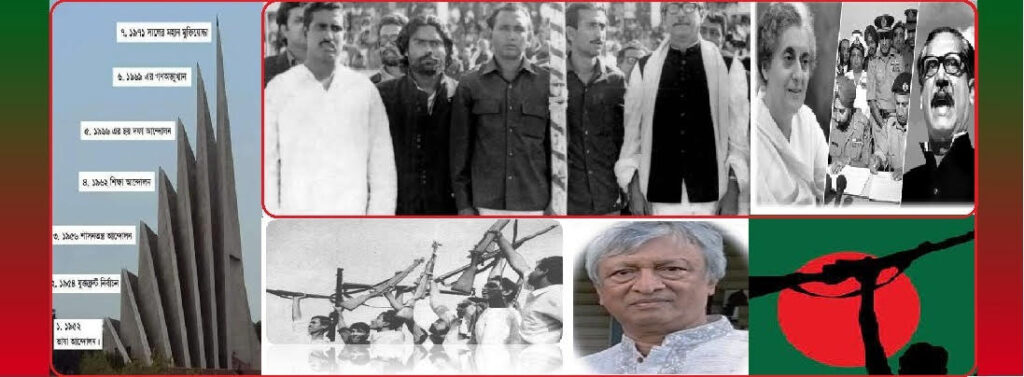Delwar Jahid

Unfortunately, the Mujib Bahini, a significant force in the liberation war of Bangladesh, has been largely forgotten and neglected in the history of national liberation. The Mujib Bahini was an active and specialized part of the Mukti Bahini, a guerrilla force that fought for the independence of Bangladesh. The Mujib Bahini was formed with workers of the Awami League and its student organization, Chhatra League, who believed in the ideals of Bangabandhu Sheikh Mujibur Rahman.
The Mujib Bahini was divided into four sectors and headed by a central command of 19 members. They received military and ideological training in the hilly areas of Dehradun under the direct supervision of Major General Uban of the Indian Army. The Mujib Bahini fought alongside other freedom fighters on the battlefield and conducted several adventurous operations against the occupying Pakistani forces.
Despite some disagreements within and outside the Bangladeshi government-in-exile over the formation of the Mujib Bahini, several senior Indian military and civil officers mediated a mutual understanding between the Mujib Bahini and the government-in-exile of Bangladesh. The Mujib Bahini had trucks, jeeps, and modern weapons to fight the occupying forces.
The Author’s personal experience on the battlefield was mixed, and an extreme leadership vacuum was created in the area after the prominent organizers of the guerrilla war had died. An all-party war management committee was formed to establish a joint command of the FF and BLF, and the Author was nominated as the organizer of the student front.
Regrettably, the achievements of the Mujib Bahini and the legendary fighters who participated in the Chhatra League have been degraded, and even Bangabandhu’s
commitment has been disrespected and underestimated in several cases. In 52 years of independence, these issues still need to be resolved.
Late President Zillur was a relative of mine…our family is historically associated with Bangabandhu’s politics. However, it can be said that we have not received anything other than giving to the country since 1971 for the benefit of participating in the liberation war… and today, we only hope that at least these actions will be recognized in our lifetime.
Many freedom fighters who once risked their lives and took part in the frontline to bring about glorious freedom did not get any honor or medal. Again, many are freedom fighters but could not show any success, like getting a medal, or in some cases, they have stolen various advantages or benefits by providing false or exaggerated information. The best example is the Bhairav operation on July 4, 1971. Nuru-Atik was discriminated against for unknown reasons despite being undoubtedly entitled to receive the gallantry award for his brave contribution to the liberation war. The country will never be free from responsibility if it is not given due recognition. The two great freedom fighters of Bhairab, Shaheed Nuru Atiq and Mohon, deserve this honor. As a proud fellow soldier, I strongly protest against these discriminations like Major General (Retd) Subid Ali Bhuiyan. These awards – ‘Bir Shrestha,’ ‘Bir Uttam,’ ‘Bir Bikram’ and ‘Bir Prateek’ and the question raised about the transparency of its distribution process by drawing the attention of the Honorable Prime Minister Sheikh Hasina and the present government, we want a straightforward remedy for these deprivations.
Who was by Bangabandhu’s side as the vanguard of advancing the immature politics of the country step by step? Let’s look back at that history. The formation of the nucleus of the top student leaders and the creation of the ‘Mujib Bahini’ as its subsequent structure needs to be considered in the background of the then communist movement in East Bengal. Mujib Bahini was to be seen in the country’s political arena in a new character, ideologically and physically. There is evidence that the “nucleus” of Sirajul Alam Khan and his followers had a socialist character. Still, including leaders of anti-socialist groups in the Chhatra League created a complex political equation. Despite not being followers of socialism, Sheikh Mani and Tofail Ahmed were included in the “nucleus.” One thing to note is that, at that time, the mainstream socialists of the country were engaged in efforts to build a university-centric position to propagate their ideals. They were involved in the strategy of creating the ‘striking force’ of future politics. One Moscopanthi (led by Mani Singh) and five Pekingpanthi ‘communist parties or groups’ are known to have been active in East Bengal. The leaders of these factions were divided into different groups. They have created a fertile field of politics for the right wing and fundamentalists by creating a dangerous mix of truth and falsehood under the guise of anti-imperialist-capitalist-feudalist politics.
When the mainstream freedom fighters of Bangladesh, including the Mukti Bahini and Mujib Bahini, were moving ahead with the inviolable destiny of dependence on India to liberate the country, there was still a massive problem with the role of the Maoists. Mujib Bahini trained themselves for a long-term war with the Mukti Bahini and participated in it. The nation will not know their contribution and identity. Not getting proper state recognition is injustice, hostility, and betrayal with the soldiers of Bangabandhu’s ideals. The government must take a clear stand on the role of the Mujib forces in the liberation war of Bangladesh and give the families of the troops their due opportunities, recognition, and respect.
[Author: Freedom Fighter, Senior Research Faculty Member of University, President, Bangladesh North American Journalists Network, resident of Canada]
